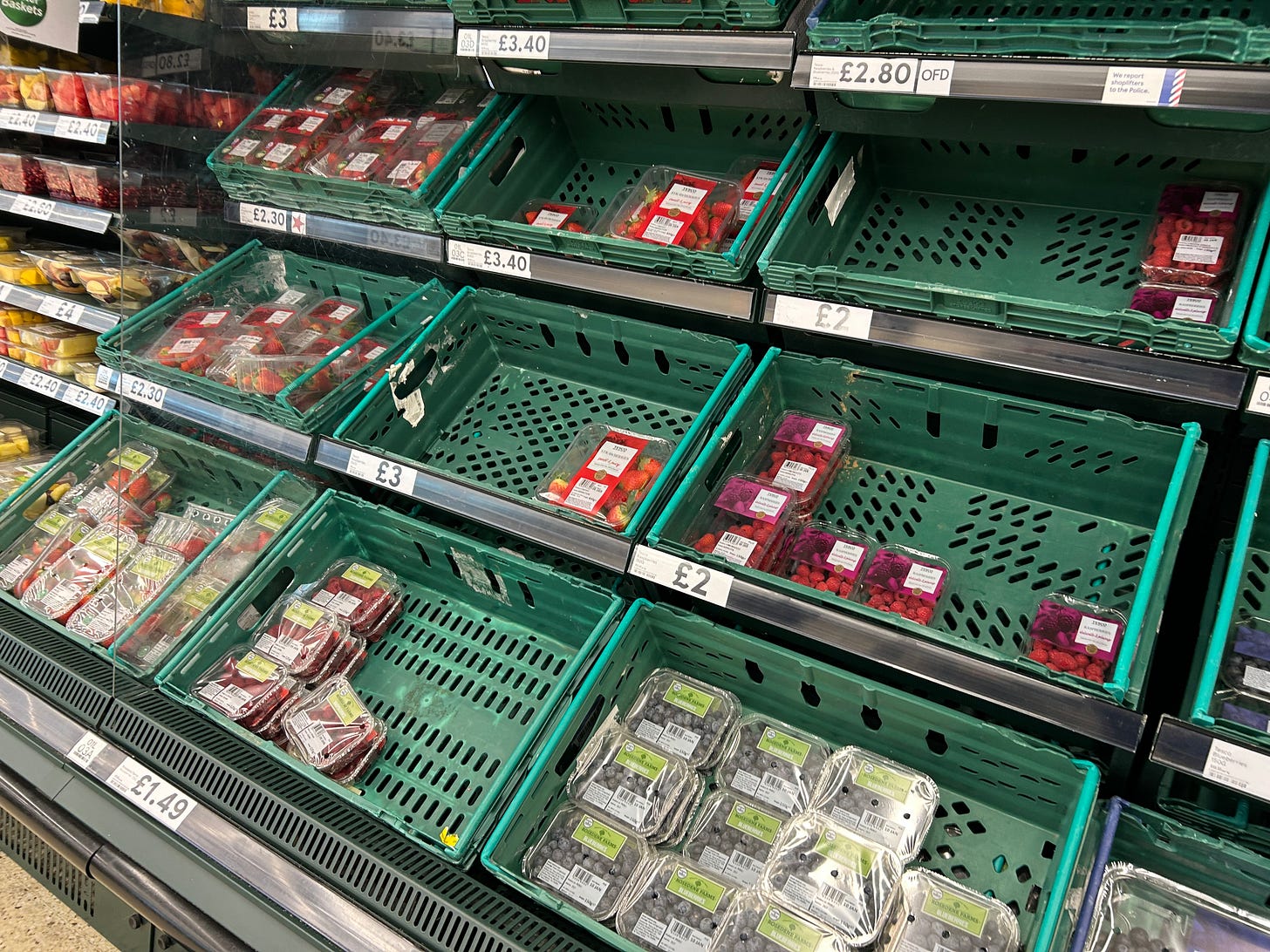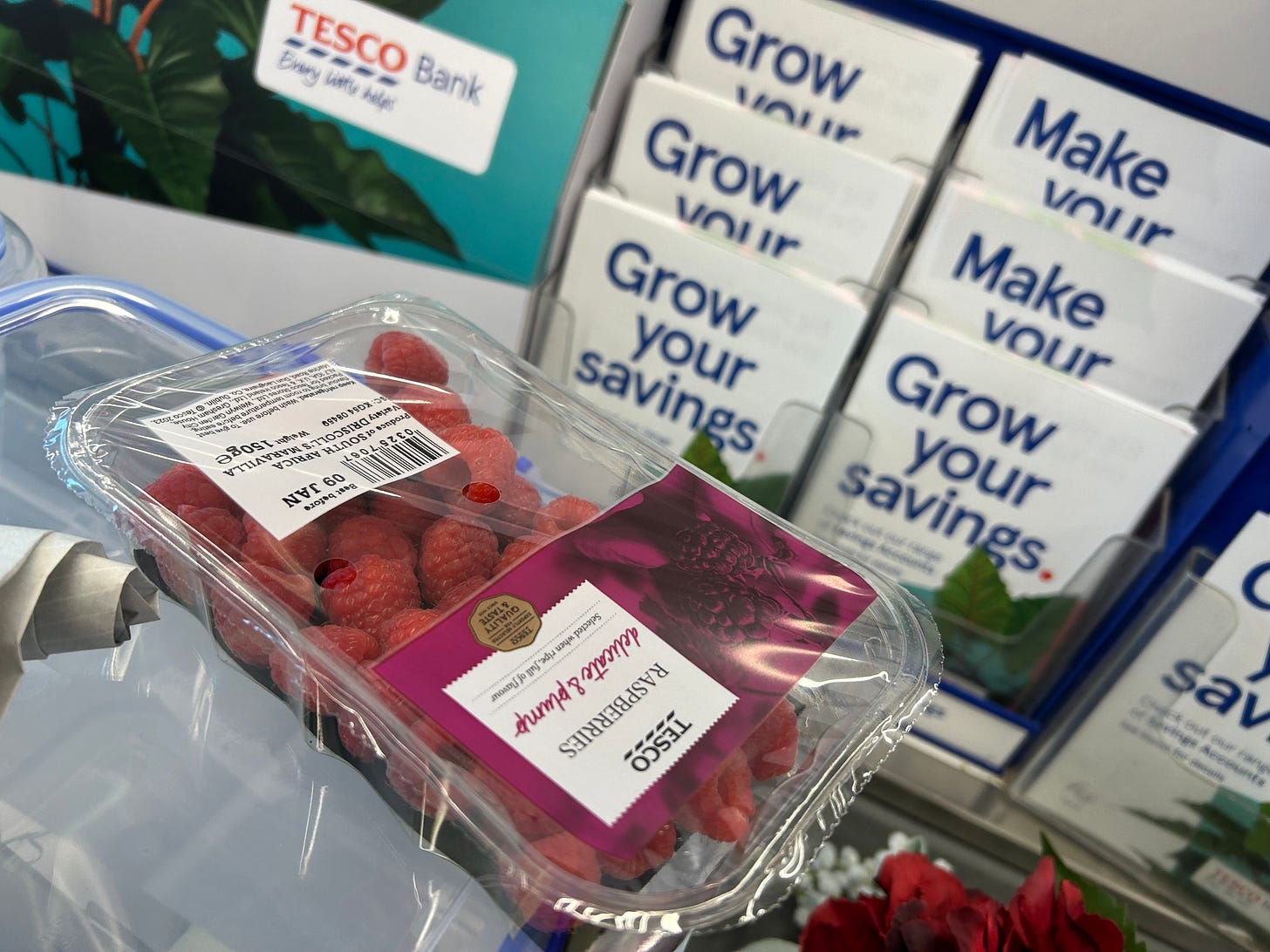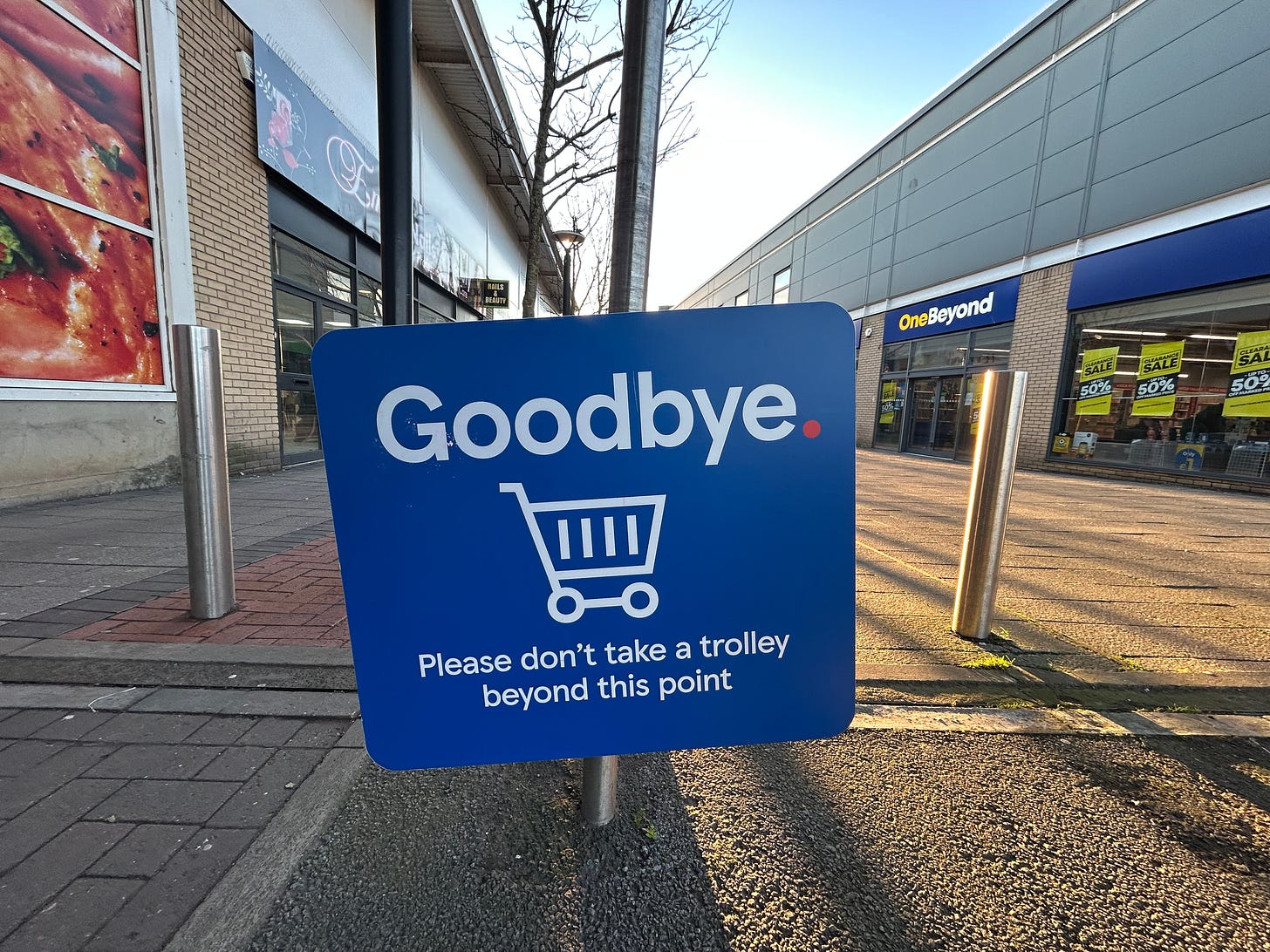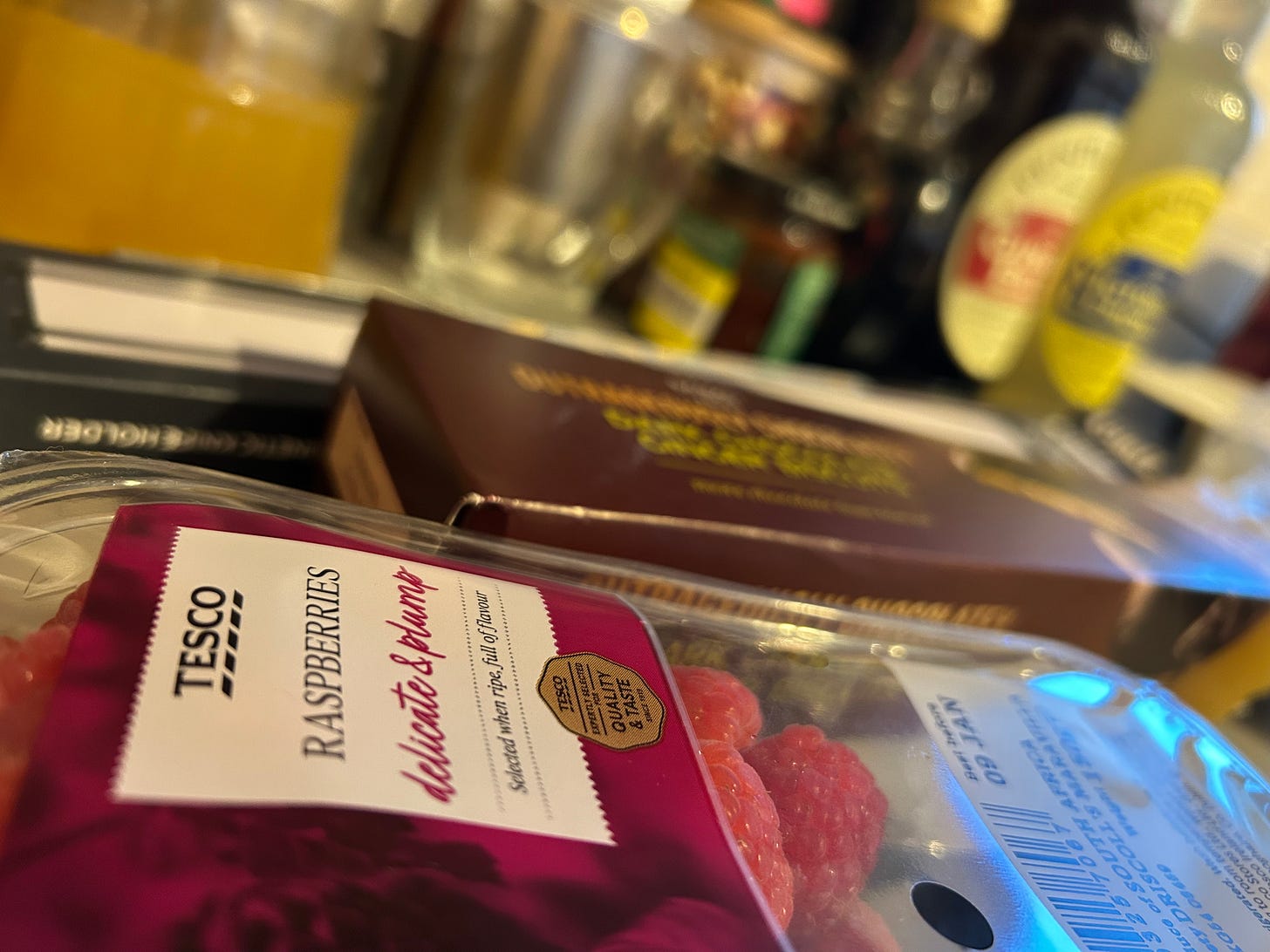The last raspberry from Tesco
On the challenges of bridging the banal with the unimaginable in an invisible war
If I lived in Ukraine, I might have concerns greater than easy access to highly perishable unseasonable fresh fruit. But then again, if I lived in Ukraine, it would be an “easy sell” to my family and neighbours that the world is at war, both conventional and unconventional. One of the many bizarre experiences of this era is putting down my laptop at home, having spent hours learning about smart dust and rogue AI, only to head to the supermarket to refill the fridge. I do like some raspberries and blueberries on my breakfast, and being a creature of strong habit I dislike interruptions to my daily routines.
The soldiers of WW1 might detect the yellowish hue and chemical smell of an attack, and shout out “gas, gas!” and would be hailed as heroes. We have righteously screamed out “genetic bioweapon! genetic bioweapon!” only to be ridiculed, outcast, and alienated. The more you perceive the silent weapons of a quiet war, the crazier you come over to their victims. Life is a nonstop straddling of two distinct realities: one where exotic weapons seize control over all biological life and redefine it; and the other, where you have to find a part for your car on eBay because your model is too old to be in stock. There is a clash between the extreme and the ordinary that never abates.
This splitting takes a toll on your mental health over time. Those in the intelligence community have high rates of alcoholism, sex addiction, and divorce because they often resort to unhealthy ways of discharging the stress of a clandestine second identity. Others turn to writing fiction, it being the only way of telling the truth. For the rest of us, it’s the flip side: no matter how hard we shout the “secrets”, few are prepared to listen. We can acknowledge the unseen risks around us, and have to seek coping mechanisms for “having to be psychotic in order to stay sane”. It is a constant effort to both be present to the wartime dangers in ordinary life, while not living in paranoid fear.
The supermarket itself has whole rows of toxins that I don’t touch, and despite this we still have to feed ourselves somehow with what remains. After Covid, I have a reasonable anxiety that another set of lockdowns might appear without notice, or a financial reset begin that closes the shops, or some other interruption of normal societal service. This, however, mutates into a kind of obsession not to be caught out. I cannot stand to see my fridge get emptied. There is always plenty of milk, often pushing its use-by date. Cheese completely fills the bottom trays. Meat gets bought at times beyond my own real need. In this psychological self-abuse, the idea of not having my raspberries in the morning has become a kind of totem for keeping up the illusion of control over out-of-control circumstances.
A male relative grew up in a household with a PTSD’d veteran father, and lost his mother when a teenager. At one point in life he took up compulsive shopping of classical CDs and discounted shirts as part of the unhealed trauma response. The military-grade psychological attack on us in 2020-21 also has wellness repercussions, exacerbated by how many of our loved ones were sucked into the hive mind and have never escaped, becoming estranged from us. I am watching as I observe my own reaction to invisible injuries from hidden war. For instance, I cannot stand to let my car become less than half full of fuel, and always keep it topped up, even after short trips away.
It is pretty obvious that a dislocating change is soon upon us. Governments that betrayed us will be removed, criminals who harmed us will be held accountable, and new systems of money, energy, and medicine will replace the failed ones. It all unfolds on a timescale that I have no control over, and barely any visibility. Until that final hammer falls, and the marathon is over, each day is eked out as an endurance test to overcome “patience poisoning”. Ordinary life decisions, like whether to go away on a long drive to see friends, suddenly become massive logistical commitments when reframed through the lens of covert war. Like an abused spouse, you are always on guard for the next “raised fist” from your surroundings, having been beaten before.
The temptation is to seek material ways around the faith problem. My own vice is to second-guess the timing of the “big event”, so that I proudly grab “the last raspberry from Tesco” before the final curtain falls. I know it is not rational — I don’t genuinely need fruit that goes mouldy within seconds of getting it home. These displacement worries are like “hobby madnesses” or “pet insanities” that allow our attention to rest away from the real horrors we commonly read about: energy weapons built into street furniture, death rays from above and beyond, nanobots that burrow into our bodies, nasties sprayed from the skies, and far more and worse. We see the corrupt abuses of science, but cannot see the containment (yet).
The urge to hoard is an innate one in the face of possible economic collapse and even famine. Almost any risk attitude, from outrageous prepper to lackadaisical sponger, can be justified by selective editing of the narrative arc. I have learned that being ready for unconventional and unplanned change is as much a question of spiritual or mental advance planning as it is having material goods. If the alarms sound announcing a nuclear WW3, my initial reaction will be to smile at the mother of all “go home now for your own safety” psyops. I wouldn’t even have to run back with my stash of fresh and juicy Tesco raspberries, purchased ideally at the final moments before the sirens went off and tills were shuttered.
The “need” to over-fill my fridge usually hides some other emotional malaise. I may be grieving for a lost relationship, or worried over a bodily health matter, or stressed by some unwanted encounter with officialdom. Some time ago I came to accept that if the price of my own sense of inner stability was occasional food waste, that’s not such an awful thing. Nobody has ever tried fighting in a military-civilian alliance during a bio-information war before. We each develop our own mental survival tactics, as we preserve sufficient continuity to let us cope with seemingly endless injustices and boundless uncertainties.
Rather than being dysfunctional, my own quest to capture “the last raspberry from Tesco” (before the end of civilisation as we know it) is more charming than chaotic or crazed. Maybe we will have a “soft (fruit) landing” and no such day of reckoning comes; maybe it will be a sudden crash (crush?), with my soothsaying abilities vindicated as triumphant postmodern fresh produce hunter-gatherer. My precious raspberries are symbolic of life in this insane war to liberate humanity from coercive control — juicy sweet when done right, yet easily damaged if not handled well.
Others must have their equally quirky ways of coping with the distress of the final days of waiting for the old order to end. Intuitively we know that something big is coming that will radically change pretty much everything. Endless crumbs have been put out to predictively program us in preparation, without giving away the all-important operational timing. There is a profound desire to reconcile with those we have been separated from, see accountability for those who hurt us, and find peace through vindication of our prescience. In the meantime, there are comforts that keep us going. Mine being timely raspberries. From Tesco.









I had always thought I was immune from PTSD. Then, out of the blue, heart failure - the heart racing at more than twice its normal speed - and part of the cure for me was to realise my own trauma from the lockdowns, the long, long wait for promised justice and the ridicule and estrangement from those who thought I was crazy. So, Martin, I resonate very much with what you've written. Those raspberries won't taste properly sweet when until you see Tony Blair (and I see Jacinda Ardern) in their new orange jumpsuits.
Yep. Been there. My solution? Acceptance. Looking back, I should have died many times in my life (I did lots of stupid, risky stuff and walked away unscathed - I’m just clearing the 4th chronic illness the doctors said would kill me, etc.,) and I’ve concluded I was protected and preserved for some reason - I think by divine hands. The last five years or so have convinced me more than ever that I’m an immortal spirit in a temporary meat suit and that whilst my experiences result partly from free will I am also under divine control/guidance. So, what’s to worry about? Certainly not death. The suffering of others definitely and I do what I can to alleviate that but I now leave worrying about the big picture on God’s mighty shoulders. What will be will be and I shall accept whatever it is with a smile and a laugh. Earthquake in Kent? Well what a surprise! 😊 House burnt down? No more repainting required or grass to mow. Car run out of fuel in a crisis? Then I’ll walk or cycle in the sunshine as I enjoyed as a child. As for important soft fruits - I freeze’m. 😂